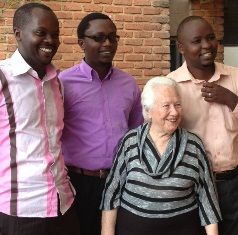USC Shoah Foundation joins peace-building initiative in Rwanda

The inaugural meeting of the Rwandan Peace Education Program brought together survivors of the Rwandan Tutsi Genocide and the Holocaust, along with other activists from around the world. From left: Appolon Gahongayire and Lambert Kanamugire, survivors of the Rwandan Tutsi Genocide and staff members of Aegis Trust Rwanda; Renée Firestone, a survivor of the Holocaust and educator, whose testimony is preserved in the USC Shoah Foundation's Visual History Archive; and Nepo Ndahimana, a survivor Rwandan Tutsi Genocide and staff member of Aegis Trust Rwanda.
With nearly 20 years of experience in historical documentation and education based on video testimony given by genocide survivors, the USC Shoah Foundation has joined an international effort to establish the Rwandan Peace Education Program, an initiative that will use testimony from survivors of the 1994 Rwandan Tutsi Genocide for peace-building activities and to raise awareness of the pressures that move people to ethnocentric violence.
The Swedish International Development Cooperation Agency convened the first Rwandan Peace Education Program meeting in January, in Kigali, to articulate the vision, mission goals, and projected outcomes. Participating organizations included the USC Shoah Foundation, Radio La Benevolencija, the Institute of Research and Dialogue for Peace, and Aegis Trust Rwanda.
Through targeted grassroots activities—many of which will involve the collection and dissemination of survivor testimony—the Rwandan Peace Education Program will promote critical thinking and dialogue on peace issues to encourage Rwandans to develop and act on their own opinions and resist the ethnocentric groupthink that divided the country in the twentieth century and led to genocide in 1994.
The program will use survivor testimony to promote social cohesion, and to provide the public with content around which to address peace issues, particularly within neutral spaces and other program-specific venues designed for education, research, dialogue, and constructive debate on solutions to the challenges that must be overcome to bring lasting peace to Rwanda. The USC Shoah Foundation will also be involved in advocacy for the integration of testimony into school curricula.
To learn more about the USC Shoah Foundation’s effort to preserve and disseminate new testimony collections, visit sfi.usc.edu/collections